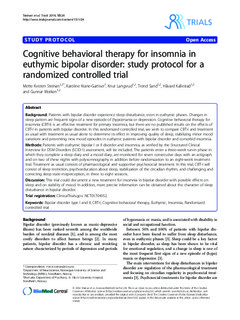| dc.contributor.author | Steinan, Mette Kvisten | |
| dc.contributor.author | Krane-Gartiser, Karoline | |
| dc.contributor.author | Langsrud, Knut | |
| dc.contributor.author | Sand, Trond | |
| dc.contributor.author | Kallestad, Håvard | |
| dc.contributor.author | Morken, Gunnar | |
| dc.date.accessioned | 2018-01-03T10:06:52Z | |
| dc.date.available | 2018-01-03T10:06:52Z | |
| dc.date.created | 2014-03-25T10:47:01Z | |
| dc.date.issued | 2014 | |
| dc.identifier.citation | Trials. 2014, 15 (24), . | nb_NO |
| dc.identifier.issn | 1745-6215 | |
| dc.identifier.uri | http://hdl.handle.net/11250/2474291 | |
| dc.description.abstract | Background
Patients with bipolar disorder experience sleep disturbance, even in euthymic phases. Changes in sleep pattern are frequent signs of a new episode of (hypo)mania or depression. Cognitive behavioral therapy for insomnia (CBT-I) is an effective treatment for primary insomnia, but there are no published results on the effects of CBT-I in patients with bipolar disorder. In this randomized controlled trial, we wish to compare CBT-I and treatment as usual with treatment as usual alone to determine its effect in improving quality of sleep, stabilizing minor mood variations and preventing new mood episodes in euthymic patients with bipolar disorder and comorbid insomnia.
Methods
Patients with euthymic bipolar I or II disorder and insomnia, as verified by the Structured Clinical Interview for DSM Disorders (SCID-1) assessment, will be included. The patients enter a three-week run-in phase in which they complete a sleep diary and a mood diary, are monitored for seven consecutive days with an actigraph and on two of these nights with polysomnography in addition before randomization to an eight-week treatment trial. Treatment as usual consists of pharmacological and supportive psychosocial treatment. In this trial, CBT-I will consist of sleep restriction, psychoeducation about sleep, stabilization of the circadian rhythm, and challenging and correcting sleep state misperception, in three to eight sessions.
Discussion
This trial could document a new treatment for insomnia in bipolar disorder with possible effects on sleep and on stability of mood. In addition, more precise information can be obtained about the character of sleep disturbance in bipolar disorder. | nb_NO |
| dc.language.iso | eng | nb_NO |
| dc.publisher | BioMed Central | nb_NO |
| dc.rights | Navngivelse 4.0 Internasjonal | * |
| dc.rights.uri | http://creativecommons.org/licenses/by/4.0/deed.no | * |
| dc.title | Cognitive behavioral therapy for insomnia in euthymic bipolar disorder: study protocol for a randomized controlled trial | nb_NO |
| dc.type | Journal article | nb_NO |
| dc.type | Peer reviewed | nb_NO |
| dc.description.version | publishedVersion | nb_NO |
| dc.source.pagenumber | 7 | nb_NO |
| dc.source.volume | 15 | nb_NO |
| dc.source.journal | Trials | nb_NO |
| dc.source.issue | 24 | nb_NO |
| dc.identifier.doi | 10.1186/1745-6215-15-24 | |
| dc.identifier.cristin | 1124474 | |
| dc.description.localcode | © 2014 Steinan et al.; licensee BioMed Central Ltd. This is an Open Access article distributed under the terms of the Creative Commons Attribution License (http://creativecommons.org/licenses/by/2.0) | nb_NO |
| cristin.unitcode | 194,65,35,0 | |
| cristin.unitcode | 194,65,30,0 | |
| cristin.unitname | Institutt for psykisk helse | |
| cristin.unitname | Institutt for nevromedisin og bevegelsesvitenskap | |
| cristin.ispublished | true | |
| cristin.fulltext | original | |
| cristin.qualitycode | 1 | |

